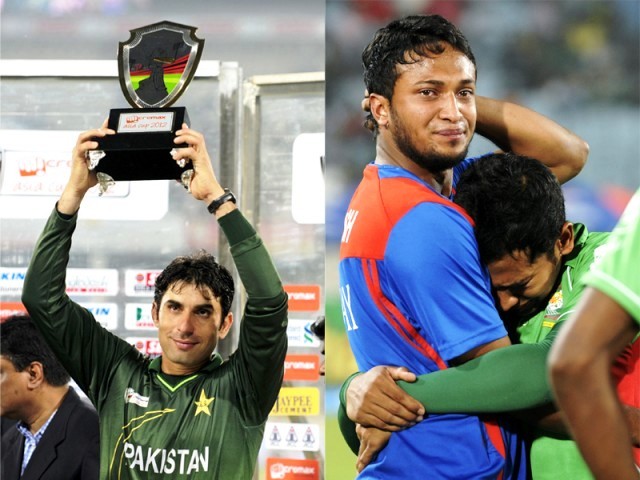
Trick question: God, Zardari, Gilani or the masses?
The incident in this Lahore school is a mere indicator of the seriousness shown in our public education system.
In the last week of May 1998, I took my final exams for grade 10. In those days, India had just carried out Operation Shakti, which was a continuation of their ‘Smiling Buddha’ nuclear test in Rajasthan.
These tests had, undoubtedly, put Pakistan under extreme pressure, and their heat was visibly felt in Pakistani politics and everyday life. Finally, Nawaz Sharif, succumbing to the pressure India had put the nation under, pushed the button for our first nuclear test.
The mountains of Chaghi turned yellowish grey and Pakistanis all over the world were ecstatic, completely oblivious to the actual consequences of this test. One of the side effects of this event that I came across was a little odd, and indeed, very unexpected.
This presented itself as a multiple choice question on my Physics exam. I stared curiously at the question:
What is the range of the ‘Ghauri missile’?
Obviously, my rote learning of projectile motions and other things pertinent to our Physics syllabus was not enough to answer this question. I lost marks for that MCQ, but didn't regret it as it was a little price to pay in comparison to the jubilation of being the first and only Muslim nation to become a nuclear power.
Now as I look back, it seemed like a patriotism-coated-joke consciously being asked in the name of education. The memory of this came flooding back to me when I saw the news about the recent examination questions set by the Punjab board. The honourable paper-setter Hafiz Ajmal sahib decided to deliver a real mind-boggling question to the ninth graders:
Who is responsible for Pakistan’s security? God, Zardari, Gilani or the masses?
Clearly, he was not brave enough to list the most logical option here.
I am sure he got what he aimed for because only those students with an IQ-level matching Einstein’s were able to answer this stupefying question. Unfortunately for him (and fortunately for the next generation of ninth graders), the paper-setter had to sacrifice his job over the matter.
The above mentioned incident is not an isolated one, and is a mere indicator of the level of seriousness shown in the public education system in Pakistan. I had the honour of receiving my matriculation and Higher Secondary Certificate through the Sindh Board. Rest assured that my class fellows and I suffered many such incidents at the hands of our examiners. However, they were never deemed "ground-breaking" enough to catch the attention of the media or the responsible office bearers at the education ministry.
Whenever I get the chance to read Dr Pervez Hoodbhoy’s columns, I feel a real sense of pity for him. The professor dares to think that the course book for physics should be rational and logical. Imagine! On top of that, he tries to explain this to people who don’t even know that MIT does not stand for Mughalpura Institute of Technology, Lahore.
When someone tries to update our physics books or tries to make them even remotely rational, it is amusing to see how religious parties consider this an attack on their faith. No matter how much you hate it, physics is and will always be secular physics. The same, unfortunately, goes for maths, chemistry, biology and other sciences.
For Pakistan Studies, the minimum standard should be honesty and pluralism (since secularism is taboo). However, our text books devote pages upon pages to the brotherhood between Pakistan and some remote African countries, but reserve only three lines to losing half of our country.
Obviously, understanding why the largest Muslim country of its time broke up, and figuring out why Sheikh Mujibur Rahman, a supporter of Fatima Ali Jinnah in 1964, ended up demanding separation only seven years post Indo-Pak independence, is not important in the eyes of the education board. Dishonesty and deceit regarding our own history prevails even today
One of the most embarrassing memories of my life was during a Pakistan studies class. Our teacher, who had a PhD degree, for some reason, decided to ask one of the only two Hindu students in our class:
Do you still follow the suttee ritual?
(Do you still burn your women in fire after their husbands die?)
Our jaws dropped. My entire class watched as the poor fellow stood embarrassed, stammering, trying to answer the question. Even we, the students, had enough sense to know that this was a direct assault on a person’s religion - a highly inappropriate question by a highly ignorant teacher.
The third US President, Thomas Jefferson once said:
"Information is the currency of democracy".
May I add that today, information is also the blood of economy and the lifeline for survival.
Effective reforms in education, with supporting economic policies, can be the strongest factor in creating opportunities for the unprivileged masses and harmonising the society. Further delay in the long-term to take concrete steps in this regard will only make the damage worse.
Unfortunately, I don't see any educational reforms coming to Pakistan any time soon. I only hope that one day, my son/daughter doesn't have to answer the question:
What is the system of life based on? Religion, world, money or Zardari sahib?
This post originally appeared here.
Read more by Ismail here, or follow him on Twitter @ismail_sultan.


COMMENTS (12)
Comments are moderated and generally will be posted if they are on-topic and not abusive.
For more information, please see our Comments FAQ